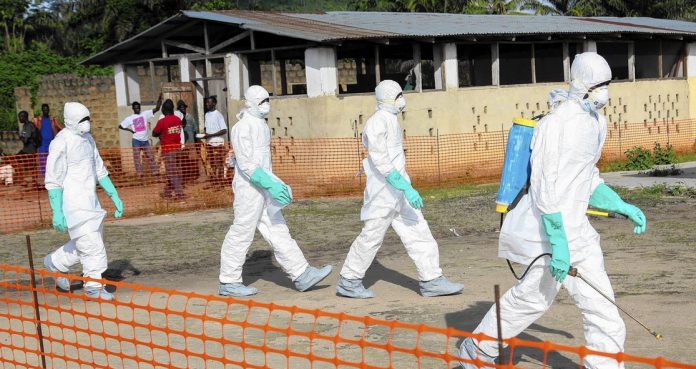A tent has been erected as an isolation ward for Ebola patients in the garden of Bwera hospital in Uganda, which is near the border with Congo.
Health workers are getting fewer gloves and when a person died after the virus outbreak from the neighboring Congo, the hospital could not find a vehicle to take away the body for several hours.
The hospital administrator Pedson Buthalha told The Associated Press, “We don’t really have an isolation ward. It’s just a tent. To be honest, we can’t accommodate more than five people.”
Ugandan medics say they are getting limited support since the first case showed up. So far, three have died.
Although Ugandan officials are praising the efforts of health workers, some workers argued and wondered where the millions of dollars spent on controlling the Ebola outbreak have gone if the main hospital lacks basic supplies.
Buthalha said, “Even the gloves are not enough.”
On Friday, the World Health Organization (WHO) said, “The Ebola outbreak is an ‘extraordinary event’ of deep concern but does not yet merit being declared a global emergency. Such a declaration typically triggers more funding, resources
WHO said it requires around $54 million to stop the ongoing Ebola outbreak.
Over 1,400 people have died since the outbreak started in August in eastern Congo, where community mistrust and rebel attacks have hampered efforts of combating Ebola outbreak.
The infection can spread quickly through close contact with bodily fluids of those infected, which could be fatal for up to 90% of people infected by the virus.
Luckily, Ugandan health workers are not facing any kind of violent attacks or community mistrusts that have affected the efforts and killed several Ebola responders in Congo. However, they still remain at risk because they seek to isolate, test and treat for the infection.
According to the WHO, at least 112 cases have been identified in Uganda since the outbreak crossed the neighborhood regions.
On Saturday, Jane Aceng, Ugandan Health Minister told The Associated Press, “District officials in Kasese were to blame for limited medical supplies after delaying in submitting their budget.”
She added, “It is clearly the responsibility of the district to order supplies. If they haven’t done the orders, we can’t supply because we don’t know how much they need.”
As far as upgrading the isolation ward in the hospital garden is concerned, the minister said, “It is not economical. It is not cost-effective to build permanent structures.” Now, health workers have the benefit of using an experimental yet effective Ebola vaccine, which is being widely used. More than 130,000 doses have been distributed so far. Uganda has vaccinated around 4,700 health workers.























